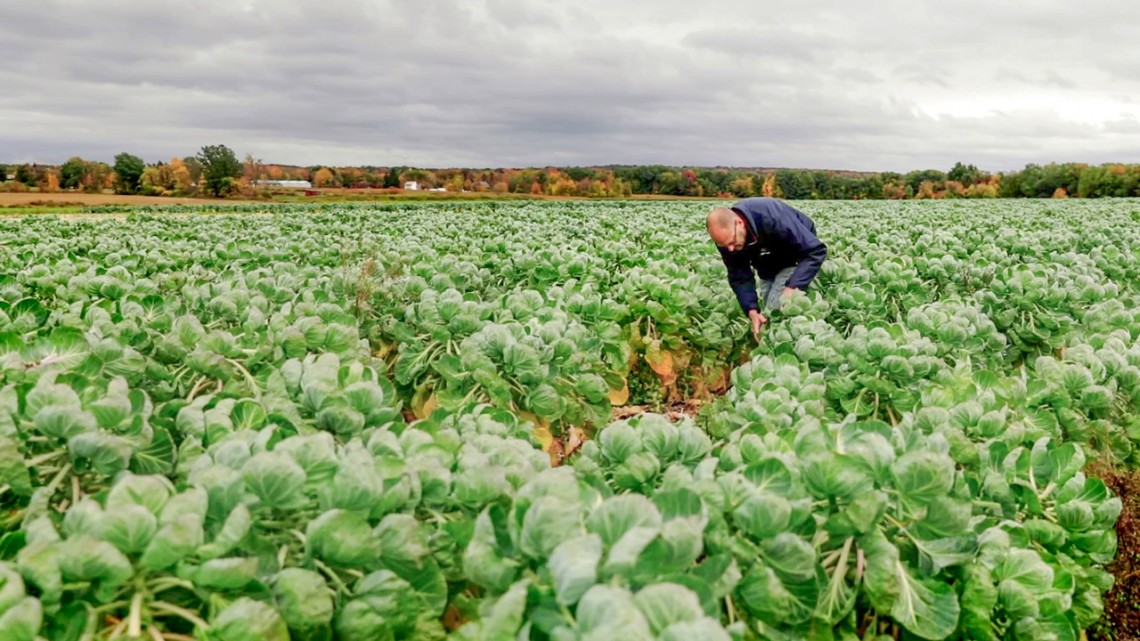
Dave Walczak, operations manager of Eden Valley Growers co-op in Eden, New York, checks on Brussels sprouts growing on 2,000 acres of co-op members’ farmland.
Upstate 2.0 wins $1M NSF award to transform economy
By Bridget Hagen
Upstate 2.0, a partnership between Cornell and the State University of New York College of Environmental Science and Forestry (SUNY ESF) that aims to bolster economic development in upstate New York, has received a $1 million development award from the National Science Foundation’s Regional Innovation Engines.
The collaboration seeks to transform upstate New York to an innovative bioeconomy, where biological resources are sustainably converted into goods and services to reverse the impacts of climate change and ensure environmental justice. This includes maximizing opportunities in food systems, forestry, robotics and fossil fuel replacement.
“This proposal will create a more resilient supply chain and grow the regional economy, all while reducing fossil fuels and creating good-paying jobs,” said U.S. Sen. Charles Schumer (D-N.Y.). “I am proud to deliver this $1 million Phase One award and I will keep fighting so scientists trained right here in Ithaca can lead the way for an upstate New York green clean energy future.”
“There is incredible potential for a bioeconomy in upstate New York,” said principal investigator Jillian Goldfarb, associate professor of biological and environmental engineering in the College of Agriculture and Life Sciences (CALS). “To build a climate-smart, prosperous upstate, our team will engage diverse stakeholders – farmers, manufacturers, entrepreneurs, educators and researchers – to create a roadmap for sustainable economic development.”
The Upstate 2.0 institutions – which now have the opportunity to compete for a $160 million federal investment – will leverage their research, education and entrepreneurial expertise in sustainable agri-food and forestry systems; climate beneficial technology and nature-based innovation; and bio-based industrial processes and products.
“ESF has more than a century of forest management research and expertise. We look forward to partnering with Cornell to put our collective resources into action to drive transformative change and sustainable economic impact in upstate New York,” SUNY ESF President Joanie Mahoney said. “The challenges of climate change are immense. Collaborations like ours are necessary to develop and implement solutions to help our state reach its net-zero goal.”
Research will be conducted through strategic partnerships among innovators, industry, entrepreneurs, job creators, policymakers and community members, with support from the Cornell Cooperative Extension network, Cornell’s Center for Regional Economic Advancement and the NSF Interior Northeast I-Corps Hub.
“Throughout our history, Cornell has been a place where ideas from different disciplines come together in new and transformative ways, resulting in positive impacts that extend far beyond our campus and region,” said Lynden Archer, the Joseph Silbert Dean of Engineering. “The NSF Engines development grant will allow us to leverage the power of our collaborative environment to create and execute a broader plan that enhances our region and serves as a model for the rest of the country.”
By developing solutions to global challenges in sustainability and building a more resilient supply chain, Upstate 2.0 aims to grow the regional economy in upstate New York while helping to realize the state and nation’s goal of a net-zero carbon economy.
“This grant will accelerate our transition to a circular economy that is based on agricultural innovation, new climate and food technologies, and carbon removal, creating new jobs in the region and placing New York state in a leadership position in climate neutrality,” said Benjamin Z. Houlton, the Ronald P. Lynch Dean of CALS.
Upstate 2.0 is one of more than 40 teams in the inaugural round of NSF Engines Development Awards, which intend to help partners collaborate to create economic, societal and technological opportunities for their regions.
The awardees span a broad range of states and regions, reaching historically underserved geographic areas. With the awards, the organizations will create connections and develop their local innovation ecosystems within two years to prepare strong proposals for becoming future NSF Engines, which will each have the opportunity to receive up to $160 million.
“These NSF Engines Development Awards lay the foundation for emerging hubs of innovation and potential future NSF Engines,” NSF Director Sethuraman Panchanathan said. “These awardees are part of the fabric of NSF’s vision to create opportunities everywhere and enable innovation anywhere. They will build robust regional partnerships rooted in scientific and technological innovation in every part of our nation.”
Launched by the NSF’s new Directorate for Technology, Innovation and Partnerships and authorized by the CHIPS and Science Act of 2022, the NSF Engines program harnesses the nation’s science and technology research, development enterprise and regional-level resources.
NSF Engines aspire to catalyze robust partnerships to positively impact regional economies, accelerate technology development, address societal challenges, advance national competitiveness and create local, high-wage jobs.
“Through these planning awards, the NSF is seeding the future for in-place innovation in communities and to grow their regional economies through research and partnerships,” Panchanathan said. “This will unleash ideas, talent, pathways and resources to create vibrant innovation ecosystems all across our nation.”
Bridget Hagen is a marketing/communications coordinator for the Center for Regional Economic Advancement.
Media Contact
Abby Kozlowski
Get Cornell news delivered right to your inbox.
Subscribe

